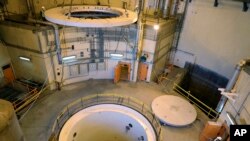The head of the United Nations’s nuclear monitoring agency says he will travel to Iran next month in hopes of reviving the 2015 accord aimed at curbing Tehran’s nuclear activities.
Speaking Tuesday in Brussels before members of the European Parliament’s security and defense subcommittee, Rafael Grossi, the director-general of the International Atomic Energy Agency, said the Islamic Republic has accumulated 70 kilograms of uranium enriched to 60% purity, with another 1,000 kilograms enriched to 20% purity, “enough nuclear material for several nuclear weapons — not one at this point.”
The threshold for making nuclear weapons is considered to be 90% purity. But Grossi told the panel that Iran’s huge stockpile of enriched uranium does not mean it has a nuclear weapon.
Grossi also said the IAEA is no longer monitoring Iran’s nuclear program because the regime has disconnected 27 of the agency’s cameras installed at its declared nuclear sites.
Iran and six world powers, including Britain, China, France, Germany, Russia and the United States, signed the Joint Comprehensive Plan of Action that restricted Iran’s nuclear program in exchange for relief from U.S. and international sanctions.
The U.S. withdrew from the agreement in 2018 under former President Donald Trump, who argued the plan was ineffective and imposed a so-called “maximum pressure” campaign on Iran, which restricted Iran’s ability to sell oil on international markets
The signatories have held several rounds of talks since 2021 aimed at reviving the original pact.
Some information for this report came from The Associated Press, Reuters and Agence France-Presse.





